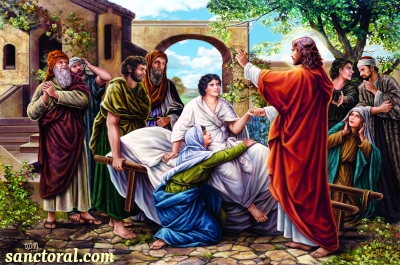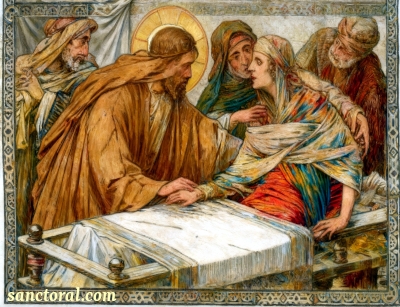The lessons in today's office are taken from the book of Job as often as this Sunday is the 1st or 2nd of September. This devout and wealthy personage of the land of Hus, endowed at first with every blessing, found himself suddenly overwhelmed with the most frightful calamities which mortal man can endure. To summarize the Scripture narrative, Satan presented himself one day, before God, and said: "I have gone round about the earth, and walked through it, and have seen how Thou hast protected Job and his house and all that he possesses. But stretch forth Thy hand a little, and touch all that he hath; and see if he will not curse Thee to Thy face." Then the Lord said to Satan, "Behold all that he hath is in thy hand; only spare his life." And very soon Job had lost his flocks, his goods and his family, while he himself was stricken by Satan with "a very grievous" ulcer, from the "sole of the foot even to the top of his head." Bearing in mind Satan's malice, the Church makes us ask that we may be defended "against all the attacks of the evil one" (Secret). And Job was reduced to such a state that the holy man could cry: "Hell is my house; my father; to worms, my mother and sister. My flesh is consumed like a worm-aten garment and my bones cleave to my skin." Further, the Church applies to the dead the pressing appeal which Job made on this occasion to his friends, "Have pity upon me, you at least my friends, for the hand of the Lord hath stricken me." But his call met with no response and Job turns towards God and cries with a firm hope: "I know that my Redeemer liveth, and in the last day I shall rise out of the earth. And I shall be clothed again with my skin; and in my flesh shall I see God. Whom I myself shall see and not another. This my hope is laid up in my bosom." In the face of this heroic trust the Lord received the prayer of His servant; He made an end of his sufferings: "And the Lord accepted the face of Job... And the Lord gave Job as much as he had at the beginning. The Epistle, of which Job is a type, prays that "It is good to give praise to the Lord; and to sing to Thy name, O Most High... To show forth Thy mercy" (Gradual). For the Lord is a great God, and a great King over all the earth (Alleluia). The Epistle, from St. Paul, is entirely devoted to rousing us up to fidelity in following the inspirations of the Holy Ghost: "If we live in the Spirit, let us also walk in the Spirit," in other words, we should be humble, gentle, charitable to the fallen, remembering how weak we ourselves are, and that before the sovereign Judge we shall have to bear the burden of our own sins. We should generously reward (with our temporal goods) those who preach the life-giving word of God to us and we should never slacken in our efforts for good, and should avoid the works of the flesh which are lack of charity, pride, avarice and lust, for those who sow works of the flesh shall reap corruption. Let us sow works quickened by the Spirit (that is, of supernatural inspiration) and we shall reap everlasting life. In the widow of Naim, weeping over the death of her son (Gospel) the Fathers were fond of seeing a type of the Church weeping over those of her children who are in the death of sin. But the tears and prayers of the Church are supremely efficacious with our Lord; He came on earth to raise up souls who lay in the death of sin and is always ready to forgive them and raise them up to the life of grace. (Saint Andrew Daily Missal with Vespers for Sundays and Feasts, by Dom Gaspar Lefebvre, O.S.B. of the Abbey of St. André, 1953) (Ps. 85:1-3) Bow down Thy ear, O Lord, to me and hear me: save Thy servant, O my God, that trusteth in Thee: I have cried to Thee all day. Ps. Give joy to the soul of Thy servant: for to Thee, O Lord, have I lifted up my soul. Gloria Patri. Let Thy continual pity cleanse and defend Thy Church, we beseech Thee, O Lord; and because it cannot continue in safety without Thy help, may it ever be governed by Thee. Through our Lord... Endowed with life by the Holy Ghost let us succour with anxious care those who are dead to the life of grace; let us also assist with our temporal goods those who by the word of truth spread abroad the life of the spirit, and let us make the supernatural life we have received at our baptism grow daily more and more within ourselves. Lesson of the Epistle of Saint Paul the Apostle to the Galatians (5: 25-26; 6:1-10) Bow down Thine ear, O Lord, to me and hear me: save Thy servant, O my God, that trusteth in Thee. ℣. I have cried to Thee all day. Alleluia, Alleluia. ℣. Thou art a God full of compassion, O Lord. Alleluia. "If," says St Augustine, "the raising of this young man from the dead filled his widowed mother with joy, our Mother, the Church, rejoices too, when day by day she sees men rising from the dead. Men outwardly mourn the death which takes place before their eyes, but the hidden death of the latter is not cared for, or even perceived by the outside world. He who knew these dead souls cared for them, and He alone knew them who could restore their life" (Matins). Sequel of the holy Gospel according to Luke (7:11-16) (Saint Andrew Daily Missal with Vespers for Sundays and Feasts, by Dom Gaspar Lefebvre, O.S.B. of the Abbey of St. André, 1953)Fifteenth Sunday after Pentecost - The raising of the widow’s son at Naim

Table of Contents
Reflexions on the Liturgy of the Day
Liturgy of the Mass
Introit
Collect
Epistle
Brethren: If we live in the Spirit, let us also walk in the Spirit. Let us not be desirous of vain glory, provoking one another, envying one another. Brethren, if a man be overtaken in any fault, you who are spiritual, instruct such a one in the spirit of meekness, considering thyself, lest thou also be tempted. Bear ye one another's burdens, and so fulfil the law of Christ. For if any man think himself to be something, whereas he is nothing, he deceiveth himself. But let every man prove his own work, and then shall he have glory in himself only, and not in another. For every one shall bear his own burden. And let us not be weary in well doing: for in due season we shall reap, if we faint not. As we have therefore opportunity, let us do good unto all men, especially unto them who are of the household of the faith.Gradual

Gospel
At that time: Jesus went into a city called Naim; and His disciples went with Him, and a great multitude. Now when He came nigh to the gate of the city, behold, a dead man was carried out, the only son of his mother, and she was a widow: and much people of the city was with her. And when the Lord saw her, He had compassion on her, and said unto her, Weep not. And He came and touched the bier: and they that bare him stood still. And He said, Young man, I say unto thee, Arise. And he that was dead sat up, and began to speak. And He delivered him to his mother. And there came a fear on all: and they glorified God, saying, That a great prophet is risen up among us; and, That God hath visited His people. Credo